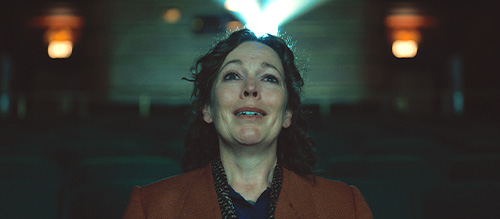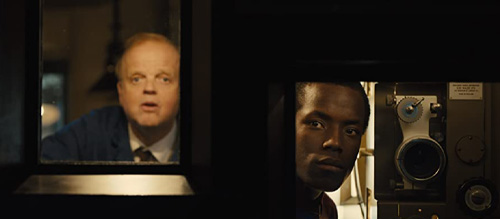Empire of Light (2022) Review

Empire of Light (2022)
Director: Sam Mendes
Screenwriter: Sam Mendes
Starring: Olivia Colman, Michael Ward, Colin Firth, Toby Jones, Tom Brooke, Tanya Moodie, Hannah Onslow, Crystal Clarke
Sam Mendes has returned following the critical success of his exceptionally thrilling and award winning World War I movie 1917 to set his lens upon a British drama surrounding staff at a south coast cinema in 1980. It has been promoted as a love letter to the cinema experience, but is a film so oblique that it’s hardly a letter at all and instead a series of barely related log lines that could have been the subjects of six or seven better movies. Whatever you have imagined this film to be, it almost certainly is not.
Part ode to cinema, part coming-of-age tale, part racial tension drama, part dysfunctional romance, part psychological thriller, part abuse story, Empire of Light is made up of disparate threads that contradict one another, that make it impossible to decipher any kind of thematic throughline. In a film of this type, with so many different intentions, it would be natural to assume that the above threads occur across the film’s range of characters and that the relatable element within the narrative is the cinema itself – just as the airport is in Love Actually or the death of a suburban husband is in Mendes’ own American Beauty – but all of the different stories Mendes attempts to tell here are told through just two characters across a relatively short amount of time, and thus each thread’s intention smashes into the next as we are thrown from a film premiere to a mental breakdown and into a racially motivated gang assault before being dragged back to a lesson about the sanctity of film projection with all the grace of King Kong swatting planes away atop the Empire State Building. It’s a real shame, too, because going back to the cinema, seeing the classic way that films used to be projected and how the exhibitors used to make each night feel special, is the only saving grace yet is presented as if an afterthought.
Sam Mendes has not written any of his projects by himself before, Empire of Light being only his second screenwriting credit of his twenty-plus year career (the first being as co-writer on the largely dialogue-less 1917), and to his credit he does land some small and emotionally stirring story beats (each of which occur in the cinema itself), but the issues with this movie are almost exclusively on the page. Beyond the disparate threads of the story there is an almost complete lack of consequences to anything or for anyone – a mental breakdown at work doesn’t cost a job, friendships or seemingly anything else; a near-death experience doesn’t cause life-altering trauma; the unconventional dynamics of the central relationship causes no tension with or for any character – and worse still there is an exploitation of real world issues like National Front racism and workplace sexual abuse that come out of nowhere to offer a small hint at stakes and conflict but then disappear (in terms of impact and meaning) just as fast. It’s a pity because it’s easy to see how a respected filmmaker writing characters with in-the-movie backstories would attract the acting talents of Olivia Colman, Colin Firth and Toby Jones, and there is some very strong work occurring behind the camera from the likes of iconic cinematographer (and regular Mendes collaborator) Roger Deakins, as well as Oscar winning composers Trent Reznor and Atticus Ross. The film is well made, just badly written.

Olivia Colman is given the opportunity to really dive into the psyche of her character here, and she duly delivers with all the class we’ve come to expect from one of the great dramatic actors of our time. And there is no doubt that the supporting players – including the young and magnetic Michael Ward – are played well, presented effectively, embraced by both the director and the actors. But as the film begins to open up and early readings, which could vary from each character representing a particular era of cinema to idealisations on the cinema itself being a means of escape for people from all walks of life, the film’s on-the-nose dialogue and stunted editing techniques (which at times look as if they’re stitching shots from two completely different films together) come to the fore, some sequences being so close to amateur in how they’re written that even Colman and Firth can’t shine any light on them.
Worse still, the film is without a lens – that being a perspective for us to view the world from. We’re not physically rooted to the cinema, though it would make for a much better movie to witness the romance and drama of day-to-day life within the walls of a cineplex, nor are we transported through the world by Olivia Colman’s Hillary or her co-lead, Michael Ward’s Stephen. We experience things happening just because they’re happening, and we can barely locate ourselves in this world because the first act makes the cinema a magical palace and the rest of the film treats it like an ugly step-child, the final act introducing us to locations and settings that we haven’t even seen before. The messaging on the page is so muddled that even a director with the credentials of Sam Mendes can’t find a perspective through which to film it, that Lee Smith (the editor of Inception and The Dark Knight) is unable to find any consistency in the footage Mendes has handed to him. Empire of Light is a mess, albeit one that holds so much potential for those hopeful for a celebration of their passion: cinema.
Those are the people with whom this film will resonate the most. People who’ve been able to get through hard times because of the escapism of sitting in the dark, alone, absorbing something profound. There are moments here that will speak to that person in ways that few films do, but they’re only moments – Empire of Light is so distracted, so lacking in commitment to this message, that even if you consider yourself to be one of those people, you’ll be left wishing that there was far more of this good stuff included.
There’s a really good film somewhere within the mess that is Empire of Light, one that celebrates the cinema as a home for catharsis, for understanding, for passion and art, one that is a celebration of culture. But it’s buried so deep beneath lesser ideas that we only get hints of what that movie could have been. This is almost certainly the worst film of Sam Mendes’ respected career, a tripe rumination on everything and nothing all at once. If you would like a film about films, and specifically about the experience of cinema, watch Martin Scorsese’s Hugo instead, or take the time to absorb the unrivalled classic Cinema Paradiso, because Empire of Light isn’t the one for you. Truthfully, it isn’t really for anyone.
Score: 10/24

